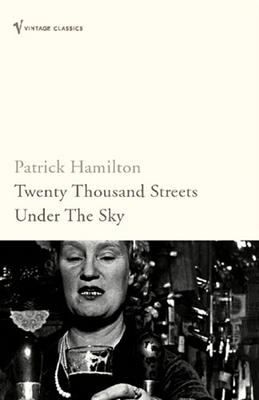
Patrick Hamilton is a sadly neglected figure in twentieth century British literature. In the inter war period he was regarded as one of the finest English novelists; laying bare the dark underbelly of depression era London.
Hamilton’s acknowledged masterpiece, ‘Twenty Thousand Streets Under The Sky’,
was scandalously out of print until Vintage issued a paperback edition last year. The subsequent BBC dramatisation of the novel will hopefully have awakened some interest in this forgotten writer, and the world which he so memorably describes. A sensitive adaptation, it perfectly captures the seedy, commercial London of the early 1930’s.
W H Auden described the 1930’s as “that low dishonest decade”. Mass unemployment, an ossified class structure, and the gathering clouds of European Fascism made this one of the darkest periods of British history. Real poverty was widespread, and many people lived lives of complete desperation, all their desires and aspirations utterly thwarted.
In the novel, Hamilton encapsulates this world in the lives of the staff and customers of the fictitious ‘Midnight Bell’ pub. The novel is actually a trilogy: the first book concentrating on genial bartender Bob, and his doomed love for the grasping, superficial, pretty prostitute Jenny. The second book concentrates on Jenny, and her descent into prostitution. The third book concentrates on Ella, her unspoken love for Bob, and the dreadful attentions of the repulsive Mr Eccles. The theme of the novel can be summarised as: Mr Eccles loves Ella, Ella loves Bob, Bob Loves Jenny, Jenny doesn’t love anybody; and is in fact incapable of love.
In his descriptions of London, Hamilton has been described as the missing link between Charles Dickens and Martin Amis. He immerses you in a world of Lyons Tea Houses, cheap cinemas, and seedy pubs.
What is truly remarkable about the novel is the fact that, despite its bleak subject matter, it is in no way depressing. He makes much use of comedy, and the indomitable optimism of the characters makes their predicament seem somehow bearable.
The ‘Midnight Bell’ was based on a real pub. Hamilton was a drinker of heroic proportions; apparently downing three bottles of black market whisky a day during the war. I’m sure the real pub is long gone, or if it still exists, has been transformed beyond all recognition. That’s a shame. I’d like to sit at the bar of ‘The Midnight Bell’ and order a large scotch, muse on the loves and fears of those people long dead, and raise my glass to the memory of Mr Patrick Hamilton.

11 comments:
Sounds a bit depressing.But will try it anyway. If its too much I will skip to the drinking and prostitution bits. Any pictures?
I'm afraid I'm totally ignorant of most literary things. The only thing I've ever read about "Lun-dun" type things was "Smashing Time", which was the book of Desmond Davis's 1967 film starring Rita Tushingham and Lynn Redgrave. Two girls go stark mod!
Smashing.
Rita Tushingham was ace. Pure kitchen sink 'oop north fantabulous.
Lynn Redgrave is a mad lefty lunatic who needs a good slapping.
Sorry coldearth, no piccies, but the BBC adaptation should be out on DVD soon.
So I will just have to skip the adverts then?
I've just Smashing Time on Amazon for £56! Fook.
How much?. You mad bint. Desist from this madness forthwith: have a cold shower or something.
I'm not paying that for it, fuck's sake. I'm not that bloody stupid.
Do you have a street name for where The Midnight Bell is located, I'll go and check and see if it's still there. I've got Hangover Square at home - any good?
Dunno, could be Fizrovia, coz that's where Hamilton drank.
I am very familiar with hangover square.
Any good, though?
Haven't read it yet. I was reffering to my own familiarity with the hangover.
Post a Comment